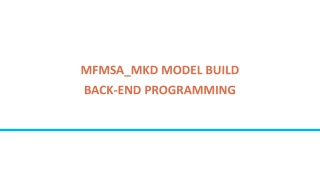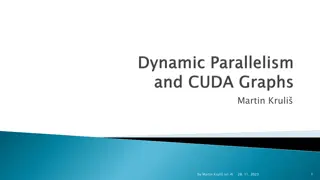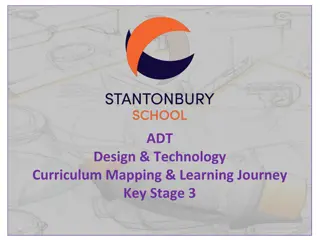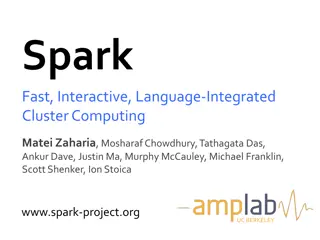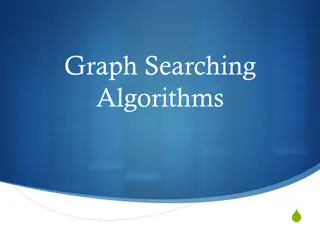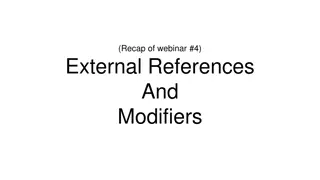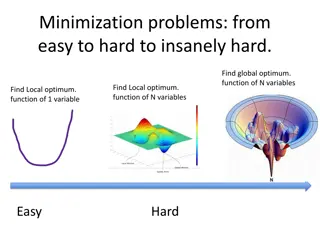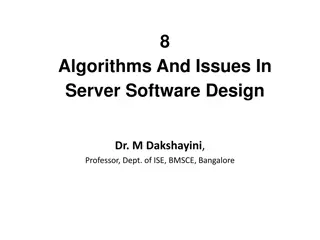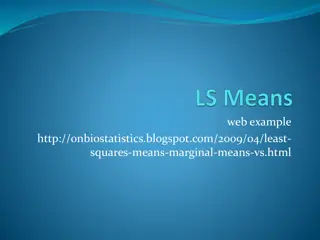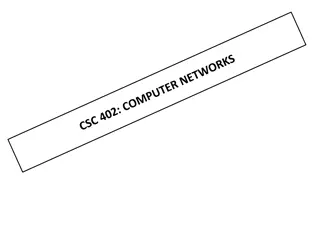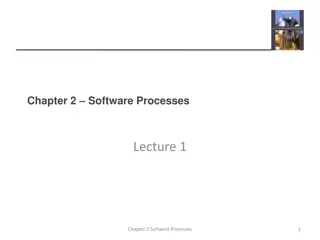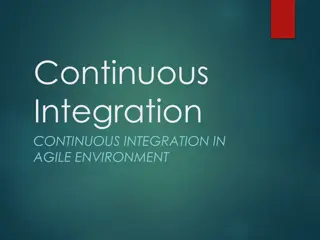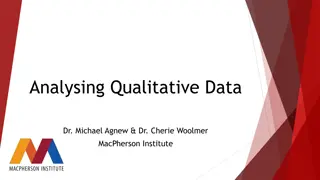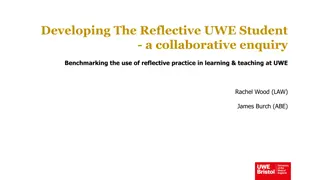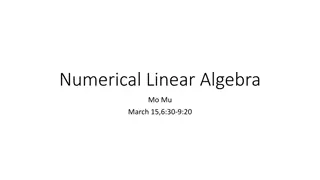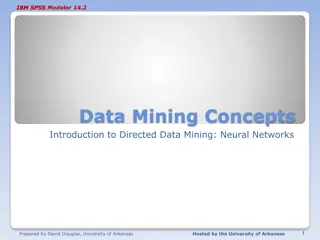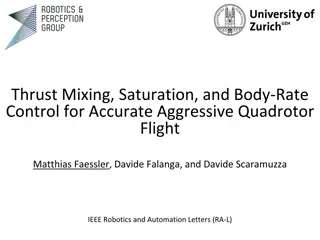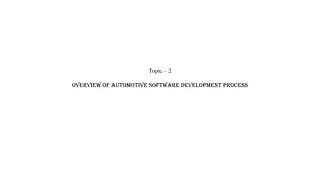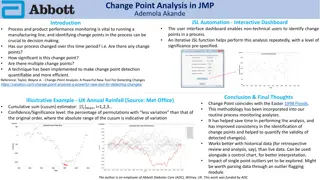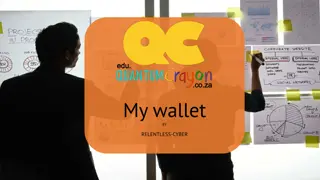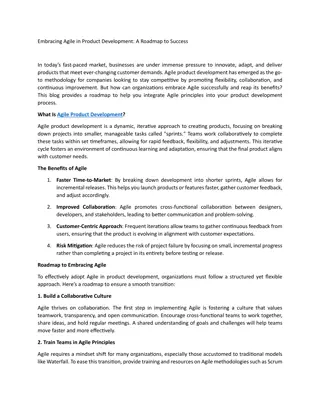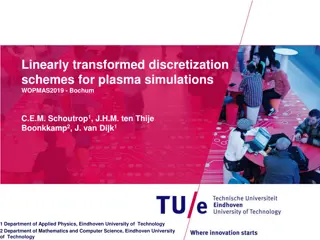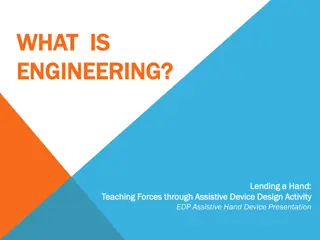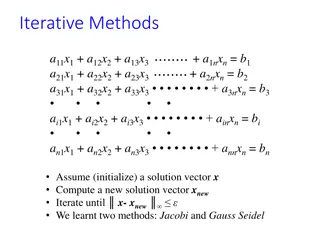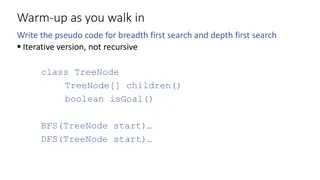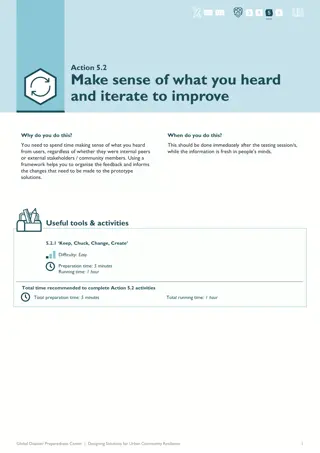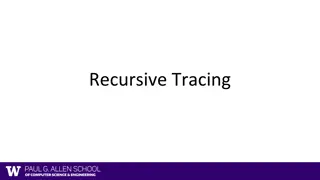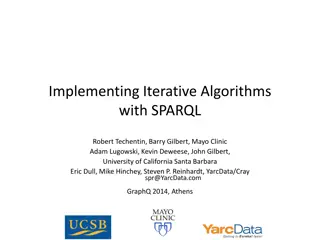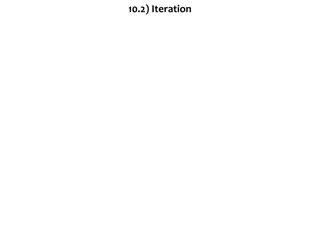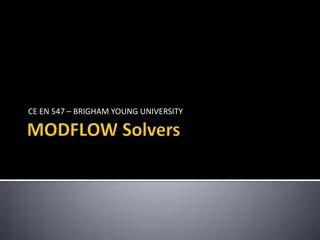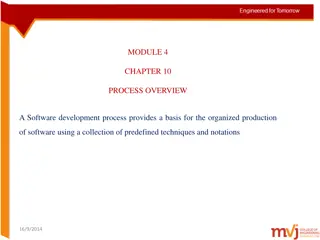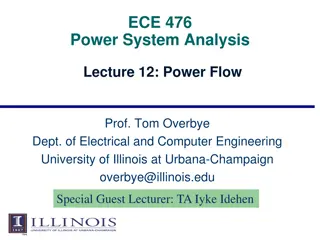Modern End-to-End Programming: Data Preparation, Model Building & Debugging
Prepare, build, debug models covering historical data. Make assumptions, solve equations, ensure data, economic consistency. Iterative processes for accurate simulations.
3 views • 10 slides
GCSE Design Technology Knowledge Organiser and Course Structure Overview
In this detailed knowledge organiser, find information about the GCSE Design Technology course structure, learning objectives, mission statement, and core technical principles for KS4 students. The course emphasizes iterative design cycles, creative thinking, problem-solving, and addressing environm
7 views • 53 slides
Understanding Parallelism in GPU Computing by Martin Kruli
This content delves into different types of parallelism in GPU computing, such as task parallelism and data parallelism, along with discussing unsuitable problems for GPUs and providing solutions like iterative kernel execution and mapping irregular structures to regular grids. The article also touc
1 views • 39 slides
Root Cause Analysis for Campaign Challenges
Root Cause Analysis (RCA) is a problem-solving method used to identify underlying causes of key process challenges in campaigns. It helps in learning from bottlenecks and successes to improve future outcomes. This analysis involves understanding what happened, why it happened, and what actions can b
7 views • 18 slides
Crafting Success How Effective Persona Creation Drives Design Success
Consagous Technologies UI UX Experts has ability to create experiences that resonate with users on a deep and personal level. Effective persona creation is the cornerstone of this success, enabling designers to understand their audience, guide design decisions, foster empathy, and drive iterative im
2 views • 2 slides
What is Email Marketing?
Email marketing is a cornerstone of digital marketing, leveraging targeted email communication to engage subscribers and drive desired outcomes. By crafting compelling content, personalized messages, and strategic segmentation, businesses can cultivate meaningful relationships with their audience. B
1 views • 7 slides
Design & Technology Learning Journey at Key Stage 3
Explore the ADT Design & Technology Curriculum Mapping and Learning Journey at Key Stage 3, focusing on the iterative design process. Dive into the essential concepts, skills, and experiences that students will encounter in this engaging educational pathway.
0 views • 26 slides
Understanding Apache Spark: Fast, Interactive, Cluster Computing
Apache Spark, developed by Matei Zaharia and team at UC Berkeley, aims to enhance cluster computing by supporting iterative algorithms, interactive data mining, and programmability through integration with Scala. The motivation behind Spark's Resilient Distributed Datasets (RDDs) is to efficiently r
0 views • 41 slides
Understanding Breadth-First Search (BFS) Algorithm for Graph Searching
This content delves into the Breadth-First Search (BFS) algorithm, a fundamental graph searching technique. It explains the step-by-step process of BFS, from initializing the graph to traversing vertices in a specific order. Through detailed visual representations, you will gain insights into how BF
1 views • 75 slides
Understanding External References and Modifiers in Provider Networks
Exploring the intricate details of external references, providers, and negotiated rates within provider networks. Learn about in-network files, iterative development, and the nuances of Medicare plans. Uncover the complexities of provider group IDs, negotiated prices, and in-network locations.
1 views • 28 slides
Binary Logistic Regression with SPSS – A Comprehensive Guide by Karl L. Wuensch
Explore the world of Binary Logistic Regression with SPSS through an instructional document provided by Karl L. Wuensch of East Carolina University. Understand when to use this regression model, its applications in research involving dichotomous variables, and the iterative maximum likelihood proced
0 views • 87 slides
Optimization Techniques for Minimization Problems
Explore various minimization problems, from easy to insanely hard, and learn about finding global and local optima using approaches like bisection, Newton's method, and rationalization. Discover efficient methods such as the golden section and iterative approximation with Newton's method for optimiz
0 views • 17 slides
Issues and Algorithms in Server Software Design
The content discusses fundamental issues in server software design such as connectionless vs. connection-oriented access, stateless vs. stateful applications, and iterative vs. concurrent server implementations. Various server algorithms like iterative and concurrent servers are explained with their
2 views • 44 slides
Understanding Means and LS Means Calculation in Statistics
Explanation of how means and least squares means (LS Means) are calculated in statistics. Describes the process of calculating means for different treatments and centers, as well as deriving LS Means through an iterative process, including handling empty cells.
1 views • 11 slides
Understanding Computer Networks and Servers
Computer networks are groups of connected computers that allow communication and resource sharing. They utilize network media, adapters, operating systems, and protocols. Servers are specialized network computers that provide centralized access to resources like applications, files, and email servic
1 views • 53 slides
Understanding Software Processes and Models
Software processes are structured activities essential for software system development, involving specification, design, validation, and evolution. Various process models and approaches like the Rational Unified Process and agile methods are discussed, highlighting the importance of adaptability in
1 views • 105 slides
Understanding Continuous Integration and Agile Methodologies
Continuous Integration involves frequent integration of team members' work to detect errors quickly, leading to cohesive software development. Agile methodologies emphasize adaptive planning, collaboration, and responsiveness to change, minimizing the risk of irrelevance in a changing world. The Agi
0 views • 22 slides
Strategic Tourism Demand Forecasting Methods
The chapter delves into qualitative and quantitative approaches for tourism demand forecasting, including the Delphi method and executive opinion juries. It explores advanced forecasting methods and the application of big data analytics in the tourism industry. The focus is on generating expert opin
1 views • 39 slides
Understanding Qualitative Data Analysis Methods
Exploring qualitative data analysis techniques such as Grounded Theory, Structured Coding, Thematic Analysis, and using tools like Nvivo to analyze large datasets. Emphasis is placed on ensuring rigor through iterative processes, understanding biases, and cross-checking themes for trustworthiness.
0 views • 7 slides
Exploring Reflective Practice in Learning & Teaching at UWE
The collaborative enquiry at UWE delves into the use of reflective practice in various professional courses, highlighting challenges and the importance of reflective capacity. A diverse group engages in iterative cycles of input, conversation, reflection, and refreshments to benchmark and enhance re
0 views • 15 slides
Comprehensive Overview of Numerical Linear Algebra Methods for Solving Linear Systems
Explore numerical linear algebra techniques for solving linear systems of equations, including direct and iterative methods. Delve into topics like Gaussian elimination, LU factorization, band solvers, sparse solvers, iterative techniques, and more. Gain insights into basic iterative methods, error
6 views • 12 slides
Introduction to Neural Networks in IBM SPSS Modeler 14.2
This presentation provides an introduction to neural networks in IBM SPSS Modeler 14.2. It covers the concepts of directed data mining using neural networks, the structure of neural networks, terms associated with neural networks, and the process of inputs and outputs in neural network models. The d
0 views • 18 slides
Advanced Techniques for Quadrotor Flight Control
The research paper discusses thrust mixing, saturation, and body-rate control for precise and aggressive quadrotor flight. It covers system overview, dynamical system modeling, LQR control design, trajectory tracking performance, disturbance rejection, body torque estimation, and iterative thrust mi
0 views • 14 slides
Overview of Automotive Software Development Process
The development of software in the automotive industry is essential due to the increasing complexity of vehicles. This process involves requirements gathering, system design, component development, integration testing, validation, calibration, release, and maintenance. Automotive-specific considerat
0 views • 5 slides
Understanding the National Adaptation Plan (NAP) Process
Explore the conceptual understanding of the NAP process, highlighting its characteristics, importance for countries, and relation to other national processes. Learn about the objectives of NAP, its flexible and integrated nature, and the focus on reducing vulnerability and mainstreaming climate adap
0 views • 13 slides
Interactive Change Point Analysis Dashboard in JMP by Ademola Akande
Explore the iterative JSL automation function for detecting change points in processes. Significance levels impact the identification of change points, enhancing decision-making in manufacturing line performance monitoring. Historical data analysis and conjunction with control charts improve interpr
0 views • 4 slides
Designing the Perfect Wallet for Mom
Explore the design process of creating an ideal wallet for a partner, focusing on portability and security. Empathize with their needs, define the problem, ideate creative solutions, and gather feedback for iterative improvements. The goal is to address the partner's preferences for a small, durable
0 views • 8 slides
Embracing Agile in Product Development A Roadmap to Success
Agile product development is a dynamic, iterative approach to creating products, focusing on breaking down projects into smaller, manageable tasks called \"sprints.\
0 views • 2 slides
Linearly Transformed Discretization Schemes for Plasma Simulations
Addressing the computational challenge of CO2 decomposition with plasmas, this study focuses on developing advanced discretization schemes and modern iterative linear solvers to ensure physical invariants are respected. The research explores the use of chemical invariants to simplify complex systems
0 views • 22 slides
Boat Building Challenge: Build, Float, and Win!
Engage in a boat building challenge where you must construct a boat capable of floating as many pennies as possible within specific dimensions and a budget. Compete in a Float-off and calculate your score based on the number of pennies floated relative to the total cost. Present your results and dis
0 views • 7 slides
Understanding Engineering: Concepts and Processes
Engineering is the application of science, math, and technology to design solutions for everyday problems, benefiting society. The Engineering Design Process (EDP) involves defining problems, researching, brainstorming solutions, building prototypes, testing, communicating designs, and redesigning a
0 views • 28 slides
Understanding Iterative Methods in Linear Algebra
Explore the concepts of iterative methods such as Jacobi and Gauss-Seidel for solving systems of linear equations iteratively. Understand conditions for convergence, rate of convergence, and ways to improve convergence speed. Delve into iterative schemes in matrix forms, convergence criteria, eigenv
0 views • 39 slides
AI Search Algorithms: BFS and DFS Pseudo-code Iterative Version
Explore the iterative versions of Breadth First Search (BFS) and Depth First Search (DFS) with pseudo-code examples implemented for class TreeNode. Understand the concept of TreeNode, children() function, isGoal() method, and apply BFS and DFS starting from TreeNode start.
0 views • 53 slides
Iterative Feedback Framework for Prototype Improvement
The iterative feedback framework involves making sense of user feedback using the Keep, Chuck, Change, Create (KCCC) model to iterate and enhance prototype solutions. This process helps organize input from testing sessions, informing necessary modifications for better outcomes. The framework emphasi
1 views • 26 slides
Understanding Recursive and Iterative Factorials through Tracing
This content provides an in-depth exploration of recursive and iterative factorial functions through tracing examples. The explanations are accompanied by visual aids to help conceptualize the iterative and recursive processes of calculating factorials. By comparing the two methods side by side, rea
0 views • 7 slides
Implementing Iterative Algorithms with SPARQL
This comprehensive guide explores the implementation of iterative algorithms with SPARQL, focusing on YarcData/Cray's approach to using these algorithms. It covers YarcData's interest in graphs, the Urika appliance, iterative algorithms in machine learning, implementation approach, and algorithms im
1 views • 12 slides
Iterative Root Approximation Using Natural Logarithm
The content covers iterative root approximation using natural logarithm in solving equations. It explores finding roots by iterative formulas and demonstrates calculations to reach approximate values. The process involves selecting intervals to show correct values and ensuring continuity for accurat
0 views • 14 slides
Understanding Iterative Solvers in MODFLOW
In this content, you will learn about the working of iterative solvers, solver parameters, troubleshooting convergence issues, and various solver algorithms in MODFLOW. The iterative tweaking of starting head values, different solver codes like SIP, PCG2, GMG, and their characteristics are explained
0 views • 21 slides
Software Development Process Overview
A software development process provides a structured approach for creating software using predefined techniques and stages such as system conception, analysis, system design, class design, implementation, testing, training, deployment, and maintenance. It involves stages like domain analysis, applic
0 views • 39 slides
Power System Analysis: Lecture on Power Flow
Lecture 12 on Power Flow Analysis in Power Systems covers the use of power balance equations when analyzing complex power consumption and generation. It explains the derivation of real power balance equations for iterative solutions in power flow analysis. The lecture highlights the need for iterati
0 views • 30 slides
